
At an unprecedented gathering of hundreds of top generals and admirals from U.S. military installations around the world, President Trump delivered a rambling speech Tuesday alongside Defense Secretary Pete Hegseth. They laid out their vision of a “warrior” culture in the U.S. military and claimed the United States is facing an “invasion from within.” Eugene Fidell, a military scholar at Yale Law School, says the meeting was a means of “exacting loyalty, special loyalty, from the most senior officers and enlisted personnel” and that by promoting a solely “white male” image of the U.S. armed forces, the administration has made clear it “wants to turn back the hands of the social clock.”
Transcript
AMY GOODMAN: This is Democracy Now!, democracynow.org, The War and Peace Report. I’m Amy Goodman, with Juan González, as we continue to look at Tuesday’s unprecedented gathering of 800 U.S. generals and admirals who were flown into the United States from around the world and gathered at Marine Corps Base Quantico, Virginia. Defense Secretary Pete Hegseth called the meeting and ordered generals and admirals to gather together for what many have likened to a MAGA campaign rally. President Trump addressed the generals for over 70 minutes, but Hegseth spoke first.
DEFENSE SECRETARY PETE HEGSETH: We are preparing every day. We have to be prepared for war, not for defense. We’re training warriors, not defenders. We fight wars to win, not to defend. Defense is something you do all the time. It’s inherently reactionary and can lead to overuse, overreach and mission creep. War is something you do sparingly, on our own terms and with clear aims. We fight to win. … Well, today is another Liberation Day, the liberation of America’s warriors, in name, in deed and in authorities. You kill people and break things for a living. You are not politically correct and don’t necessarily belong always in polite society.
AMY GOODMAN: President Trump claimed the United States is facing an “invasion from within.”
PRESIDENT DONALD TRUMP: Only in recent decades did politicians somehow come to believe that our job is to police the far reaches of Kenya and Somalia, while America is under invasion from within. We’re under invasion from within, no different than a foreign enemy, but more difficult in many ways because they don’t wear uniforms. At least when they’re wearing a uniform, you can take them out. These people don’t have uniforms. But we are under invasion from within, and we’re stopping it very quickly. After spending trillions of dollars defending the borders of foreign countries, with your help, we’re defending the borders of our country from now on.
AMY GOODMAN: We’re joined now by Eugene Fidell, senior research scholar at Yale Law School, where he teaches military justice. He co-wrote a piece for The Hill headlined “Trump and Hegseth want to turn the military into a tool of personal loyalty.” He’s an expert on military law, served as a judge advocate in the U.S. Coast Guard.
Eugene Fidell, thanks for joining us. Explain what you mean, as people describe this unprecedented gathering, where it is many of these generals and admirals were asking why they had to be flown in. This was live-streamed. What was the point of this?
EUGENE FIDELL: Good morning.
Well, the first thing is, I think you omitted what the generals and admirals actually said. There was probably an expletive that was inserted in their comments.
But I think, really, the reason for this unusual event at Quantico, unusual and costly event at Quantico, is probably not that hard to figure out. It’s the greatest of all photo ops. We’re all used to photo ops, President Trump with police chiefs as the backdrop, GIs with the backdrop. We’ve seen them in prior administrations, if you remember the “Mission Accomplished” photo op that President George W. Bush offered us, wrongly. So, I think there’s — the photo op stands out as an important factor.
Second, it’s a way of, maybe subliminally, but not so subliminally, exacting loyalty, special loyalty, from the most senior officers and enlisted personnel in the U.S. armed forces. I think every American, by the way, should watch the video. It’s extremely instructive. And even though it’s time-consuming, and it will annoy many viewers, I think it’s a critically important document that people should be exposed to.
JUAN GONZÁLEZ: And, Mr. Fidell, I wanted to ask you — in terms of some of the stuff that Hegseth said, for instance, “You kill people and break things for a living,” “We’re training warriors, not defenders,” what are they — what are they trying to impart to these generals?
EUGENE FIDELL: I think they’re — what the broadcast here is a rejection of so many of the progressive innovations that the U.S. armed forces have experienced since World War II. That’s what we’re talking about. It wasn’t until the Truman administration, for example, that there was racial desegregation in the U.S. armed forces. The introduction or reintroduction of women in the armed forces was a major issue. The dirty word in this environment is “woke,” being woke, or DEI projects. All of these serve a useful purpose in terms of integrating American society, and the U.S. armed forces is supposed to be a replica of American society, not simply a white male American society.
There were so many things that were off in this event. I’ll just tick off a few, if you don’t mind. Personally, I found the sectarian religious references highly offensive and inappropriate. That has no place in a nonreligious event, basically a command performance.
I thought the notion that we’re going to get tough with people, as if that’s something new — the U.S. armed forces have always been tough. But the difference is that, until now, there’s been no question about our armed forces’ compliance, strong efforts to comply, with the rules of armed conflict. What you hear here is a replica of things that happened under President Trump’s first administration, where he was pardoning people that were charged with or had been convicted of highly illegal conduct in war zones. And what this is is a kind of green light, that we’re going to throw the rule book out.
And you have to connect some dots here. Remember, one of the first things this administration did was fire a couple of the judge advocates general, the senior lawyers, senior uniformed lawyers, of the armed forces. That’s a terrible signal, and as if they were like softies. They weren’t softies. They were tough people who rose, by dint of their natural gifts, their training, their loyalty, their patriotism, to the highest levels. So, you have to view this holistically with other things that have happened.
I think that one scary point that Mr. Hegseth made was that they were going to make sure that anyone who made a complaint in the armed forces that was later shown not to be substantiated would themselves be subject to prosecution. Well, can you think of a better way to chill the filing of complaints? Now, certainly, there are valid complaints, and there are invalid complaints, and there are complaints that are somewhere in between, that require some investigation. But what they’ve done here is send a clear signal that if you make a complaint, you are going to personally be in the crosshairs if it turns out that we don’t agree with your complaint. That’s a preposterous position.
AMY GOODMAN: So, what do you see is the likelihood, following from that, that the officer class would refuse to deploy troops against U.S. citizens, Eugene Fidell?
EUGENE FIDELL: Well, my feeling is that the people who are going to be on the receiving end of these orders — I’m talking about the senior officers — they should be talking to their lawyers, and not necessarily their staff judge advocate, their uniformed lawyers assigned to advise them, because they may need more independent and confidential advice as to what to do. Remember, the staff judge advocate is not the commander’s lawyer. The staff judge advocate works for the government. And those conversations may prove not to be confidential. And what these senior officers need most of all is some good, private legal advice to help them ensure that they can distinguish between orders that are lawful and orders that are not lawful.
Orders that are lawful, of course, have to be complied with. But some of these issues, some of these orders, about the internal war, for example, or going to war in Chicago as a training mission, raise questions as to whether they’re lawful or not — under, for example, the Posse Comitatus Act, the 19th-century legislation that’s been on the books and has made sure that the Army, the military is not involved in garden-variety law enforcement, until now.
Some of those issues are going to be touchy legal issues that lawyers are going to have to get smart on, hit the books and be prepared to give advice. Maybe the senior officers are going to be able to get that advice, that they badly need. And we already know that, based on what Mr. Hegseth and the president have said. And maybe they’ll be able to get it within the service, but if I were a general or an admiral right now, I’d pick up the phone and call my lawyer, preferably somebody who is knowledgeable in the field.
JUAN GONZÁLEZ: I wanted to ask you, as well — the U.S. military, probably of any institution in American society, has made the most strides, especially during the volunteer army period, in terms of racial diversity and ethnic diversity. Thirty-five to forty percent of the U.S. military are African American and Latino. How do you sense that this whole anti-woke theory of Hegseth and the president — what kind of impact will this have on U.S. military morale?
EUGENE FIDELL: I think it’s going to have a very bad impact. We’ve learned, correctly, over the last several generations that unit cohesion is so critical. And in our country, cohesion is not everybody looks alike, talks alike, you know, and so forth. It’s a cohesion based on diversity and the celebration of diversity in our country. Remember the great poem “The New Colossus”: “Give me your tired, your poor, / Your huddled masses yearning to breathe free.” People accepted that offer. My family, everybody’s family can account for that, except Native Americans. And we’ll get to the Native American community in a minute.
But we’ve just made tremendous strides, as you point out. And I see this going back in time to an all-white, all-male military establishment, and I think that that would be so unfortunate. Even when I was on active duty, even though it was well after the Truman administration, there were still holdovers. People who worked in the galley on Coast Guard cutters were often African American, Black sailors. There were stewards who were often Filipino Americans. And that’s not that long ago. So, you know, even since then, we’ve made tremendous strides.
And if you look at some of the people who have been sidelined by this administration, some of these fantastic women officers, fantastic officers of color, you know, there’s a lesson there. There’s a lesson that Americans have to take away. This is an administration that wants to turn back the hands of the social clock, whether it’s Teddy Roosevelt charging up San Juan Hill, whether — I mean, pick your — pick your historic illustration. But it’s not today’s America. It’s not today’s armed forces. So, fasten your safety belts. This is going to be a wild ride.
Now, I want to say a word. I mentioned the Native American situation. There was one point that President Trump made in his remarks at Quantico that I think has been neglected. One of the things he’s celebrating in American history is the war that we waged against Native American tribes, as if that was something to celebrate. I happen to live in a town, Stockbridge, Massachusetts, that was an Indian town. It was the Stockbridge-Munsee Nation, which is now no longer in this area. But, you know, we have to be aware of the fact that our history in dealing with Native Americans is a very, very grim and bloody affair. And for him to celebrate the Indian Wars, to you use the — you know, the old term, is really shocking in this day and age.
AMY GOODMAN: Eugene Fidell —
EUGENE FIDELL: End the editorial on that.
AMY GOODMAN: I want to thank you so much for being with us, senior research scholar at Yale Law School, where he teaches military justice. We’ll link to your piece in The Hill, “Trump and Hegseth want to turn the military into a tool of personal loyalty.”
Coming up, we go to a major decision. A Reagan-appointed judge in Boston has issued a scathing rebuke of the Trump administration for illegally trying to deport pro-Palestinian international students and academics. Back in 20 seconds. We’ll be also speaking with Mahmoud Khalil.
[break]
AMY GOODMAN: “Black Waters,” performed by Nora Brown and Stephanie Coleman in our Democracy Now! studio.

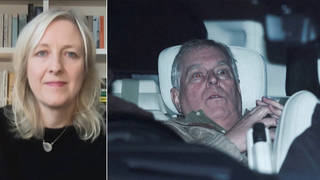
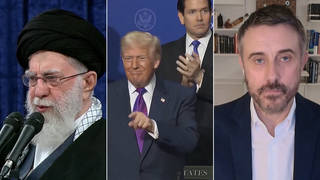
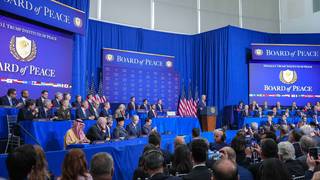
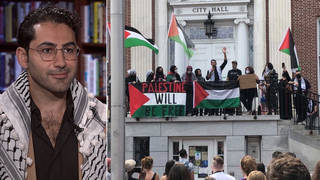





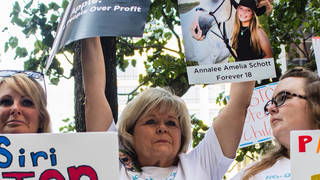
Media Options